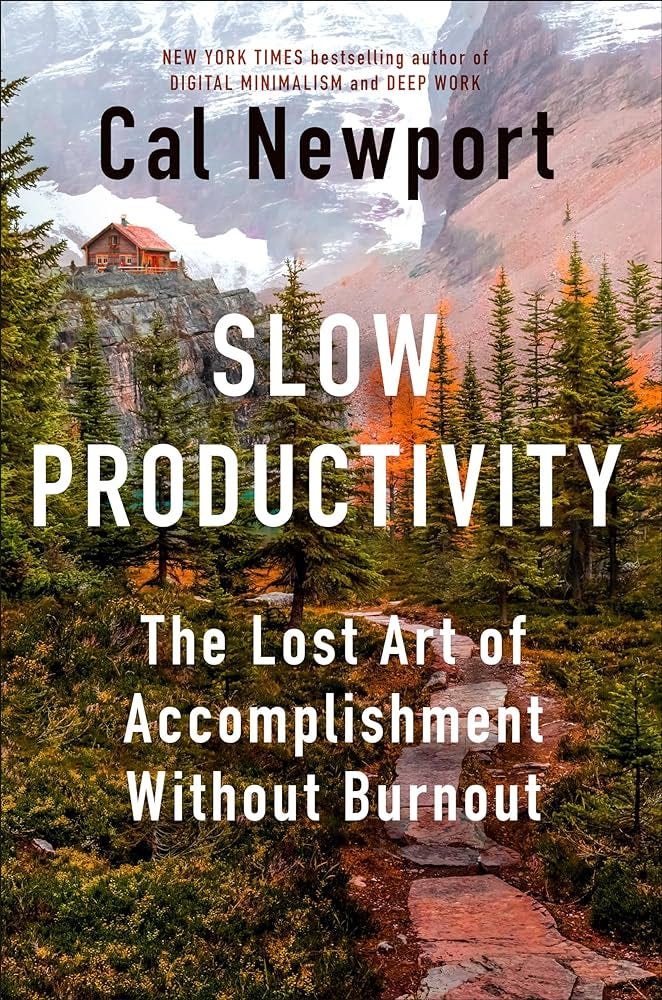What to Read Next: Cal Newport and Slow Productivity
Issue #321, featuring "Slow Productivity" and "Deep Work"
Happy Friday, readers!
I’m not much into the self-help genre these days. Once you’ve read a couple dozen, you’ve read ‘em all. One of the few exceptions is Cal Newport, whose ideas I return to and think about often. His work is all about productivity, but from a healthier vantage point than what you often find in the genre. All of his books put an emphasis on slowing down, disconnecting, and focusing deeply on the things you do best.
In today’s newsletter, I have a few words about his newest book, which just came out this month, as well as Deep Work (2016), which I read a few years ago but comes to mind often.
Slow Productivity: The Lost Art of Accomplishment Without Burnout
The ideas found in Cal Newport’s newest book aren’t revolutionary — I’ve come across similar themes in a number of books, articles, and podcasts. But humans are forgetful creatures and need constant reminding, especially in our internet age which relentlessly tells us to do more. Where this book really succeeds is in how Newport succinctly conveys the message into three very memorable principles:
Do fewer things
Work at a natural pace
Obsess over quality
It speaks volumes that I remembered those without consulting the text — it’s usually the case that I’ve forgotten the specifics of a self-improvement book within hours.
Through a variety of anecdotes and bold ideas, Newport convincingly argues that we’re all just doing too much on a daily basis. And it’s not necessarily about the raw volume of work, but about the number of different tasks and projects we’re engaging with. We’d all be better off intensely focusing on just a few projects — and, ideally, just one per day — than the myriad directions that knowledge workers are often pulled in.
Newport rightfully acknowledges that this stuff can often be outside what’s controllable, especially in fields that rely on hourly billing or are appointment-based (legal, healthcare, etc.). But plenty of us have more agency than we realize when it comes to setting schedules and pursuing projects; it just takes a little bit of forethought and expectation-setting. And it’s not just for personal reasons of work-life balance; it’s actually better for business. Working slower on fewer things almost always yields greater results in the long run.
I’ve read all of Cal’s books and can somewhat easily say that Slow Productivity is my new favorite. I have a hankering to put those three principles onto some kind of print to hang in my office. They make for a perfect workday mantra. Slow productivity, as a concept, may be paradigm-shifting for readers who haven’t come across these ideas before; for those who have, it’ll be a potent reminder about how to slow down and get more done at the same time. Great stuff all around.
Deep Work: Rules for Focused Success in a Distracted World
The modern employee is plagued by “shallow” tasks like meetings, emails, and rote to-dos, not to mention the distractions of social media and the internet at large. To combat that plague, Newport presents the idea of deep work: long, intensely focused chunks of time devoted to our most important, highest-value pursuits.
It’s no secret that distractions are killing our collective productivity. What’s interesting is that this book was published in 2016, and the problem has only gotten worse. As Newport does best, he outlines specifically how to implement deep work into your routine. It’s definitely not always easy, especially in the world of Slack, Teams, and overflowing email inboxes, but it is a game changer if you can commit.
I read Deep Work a few years ago and the ideas have stuck with me ever since. The hard part, of course, is putting the important stuff into action. I start out every year intending to put more deep work into my schedule, only to inevitably get waylaid by Slack and supposedly “urgent” problems/tasks (which are rarely actually urgent).
If you're a knowledge worker or creative of any kind, I can guarantee you'll find something useful in this book. Paired with Slow Productivity, it’s an especially potent combination of ideas that can fundamentally change how you approach work.
Thanks so much for reading. I deeply appreciate the time and inbox space.
-Jeremy




Deep Work was transformational for me and I just flagged Slow Productivity for my next big project inspiration. Thanks!
Planning to read this!